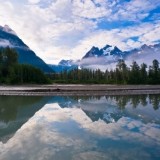BC is a special place – so much so, its specialness requires no justification to those of us fortunate enough to have been born here, nor to those who’ve had the good sense to flee other parts of Canada and the world to make this their home. But BC’s uniqueness extends beyond its breathtaking geographical features, its iconic fish and wildlife, and its rich cultural diversity. We’re not Quebec – but we’re every bit as distinct on this side of the Rockies from the rest of the country. I’m a proud Canadian – but I’m also a dyed-in-the-wool fourth generation British Columbian and I care very deeply about this particular province, as I know do many of my fellow British Columbians.
And so, in the aftermath of a federal election which granted Stephen Harper his fabled majority, it is crucial that we British Columbians now turn our attention to British Columbia. Our last defence of the environment and public interest here lies with our next provincial election.
In a country as large as ours, with a federalist system in which provinces hold a significant share of constitutional, budgetary, and governing responsibilities, the relative impact of a government on the lives of its people increases the closer to home it gets. The lion’s share of our daily services is provided by municipalities and regional districts; while most of our health care, education, and major resource decisions are made by the Province. I don’t point this out to downplay the importance of federal politics in shaping our society, but to remind BC voters that an even more momentous decision awaits us in the coming months or years (depending on Ms. Clark’s fancy), when we return to the polls to decide the future of BC.
It’s difficult for any concerned environmentalist here not to cringe when contemplating what Stephen Harper will now attempt to do to this province of ours – with regards to oil pipelines and tankers, natural gas fracking, fish farms, federal support for private power, etc. – but that’s nothing compared with the prospect of a renewed mandate for a BC Liberal government, which is even further right wing than Harper & co.
If you don’t believe that, look to Taseko Mines’ proposal to destroy Fish Lake in the Chilcotin region for a gold and copper mine. The application sailed right through BC’s paltry environmental assessment process, only to be halted in Ottawa by the Harper government.
Not even they could overlook the mountain of evidence from DFO and myriad scientific, conservationist, and indigenous interveners that suggested the ecological trade-offs were simply too great. The company had told the BC Liberal government it just had to destroy the lake, or the mine wouldn’t be economically viable – which the Liberals accepted without question. The company maintained this position until the very day after the feds rejected its plan, at which point – lo and behold! – it suddenly realized it could build the mine, make a healthy profit, and keep the lake! I believe that’s what Charlie Sheen calls WINNING!
But who was there, just one day before this extraordinary admission from Taseko Mines, to suggest that as premier she would impose on the prime minister to reverse his environment ministry’s decision and allow the company’s original lake-destroying plan? Christy Clark, who it now appears – and I never thought I’d find myself saying this – may be even further right than Gordon Campbell (making her a full two shuffles to the right of Harper)!!
Not only does this incident illustrate how stark, raving anti-environment, anti-public, and anti-First Nations the Clark administration is (it was the Tsilhqot’in people who led the fight to save their lake and territory from the mine), but it pokes a hole in the Liberals’ perceived economic competence – which the NDP needs to be able to undermine if they are to form government this time around. The BC Liberals allowed themselves to be fooled by a mining company, claiming it needed to destroy the lake, when it didn’t. The only difference was an extra $300 million in pure-profit dividends to shareholders, for cutting corners at the environment’s expense.
It’s the same story with private power in BC – another prime example of the financial folly of this government, made all the more comical by their sudden head scratching as to how on earth rates for Hydro consumers can be going through the roof after 10 years of prudent economic stewardship by their government. How could it be? We must strike a task force to get to the bottom of this! Of course, it has nothing to do with the $50 Billion of unnecessary, environmentally damaging private river power contracts we’ve signed at 2-3 times the market rate! (Note to Task Force: let’s be sure to leave that stone unturned).
So to those fiscally conservative folks in BC who went with Stephen Harper, I suggest we need to hedge our bets and install a progressive provincial government. With the combination of the 75-80% of citizens opposed to oil tanker traffic on our coast, backing up the the strong, unified First Nations opposition to Enbridge, plus the international attention building on the issue and a government on side in Victoria, I like our chances for protecting our coast from a catastrophic oil spill. But that provincial representation is essential in this equation. With both the feds and province walking in lockstep – or trying to outdo each other on who cares least for the environment – for the next four years, we’ll be in trouble.
So let’s not be suckers for the old myth of BC Liberal economic superiority. Let’s look critically at their staggering deficits and debt increases. Let’s acknowledge the NDP delivered better job growth throughout their decade in power (believe it – it’s a fact). Let’s admit that the Liberals have a ridiculous BC Place Stadium roof, a billion-dollar convention centre boondoggle, and wildly over-budget highway spending to the NDP’s fast ferries. Let’s agree that, regardless, jobs and economic growth can’t come at the expense of our environment and the public interest. Let’s survey the the political landscape, take stock of Harper’s victory and what that bodes for BC – and be smart about our future.
We may have several months or several years – or anything in between – but a provincial election is coming in BC and there’s a hell of a lot more riding on it for us British Columbians and our treasured environment than the federal one we (or half of us anyway) just voted in.
It’s time to batten down the hatches and save BC!





